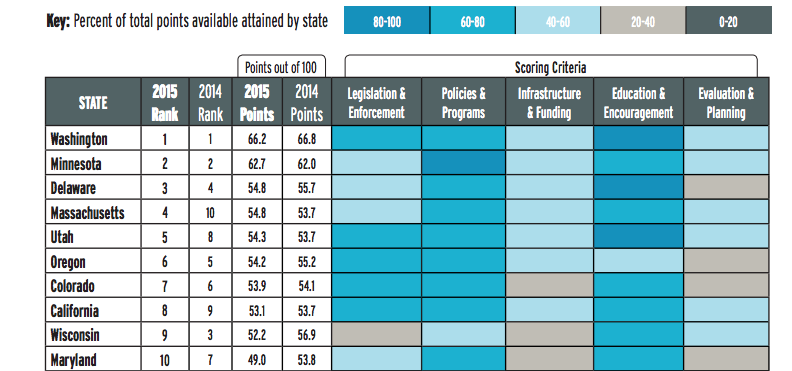Colorado Loses Ground to Utah in National Bike-Friendly Rankings

Colorado is falling behind other states when it comes to bike-friendliness, according to new rankings from the League of American Bicyclists. Utah has leapfrogged the Centennial State, which dropped one position compared to last year. While Colorado can still claim a high ranking, the Bike League is grading on a curve: Scoring 53.9 out of 100 is enough to nab seventh place.
In 2013, Governor John Hickenlooper pledged to finish in first place “in the near future.” Colorado ranked second nationally that year, then slipped to number six last year before dropping another spot in the current rankings.
“It’s not that we’re losing that many points, it’s that other states are figuring it out and moving ahead faster,” said Dan Grunig, executive director of Bicycle Colorado, the statewide bike advocacy group. “We can’t rest on our laurels.”
Colorado’s score reflects stagnancy, particularly with respect to funding and planning for bike infrastructure. The state’s relatively high ranking is due primarily to investments made in the past decade, Grunig said.
The League bases its decision on five categories: legislation and enforcement, policies and programs, infrastructure and funding, education and encouragement, and evaluation and planning. Colorado scored well — 4 out of 5 — in three of those criteria, but faltered when it came to the other two: infrastructure and funding, and planning and evaluation. The state earned just a 2 out of 5 in those categories.
Utah scored better in all five categories, landing it the number five spot overall and the highest ranking of any state in the Rocky Mountain West. Grunig called that “concerning,” given biking’s key role in Colorado’s tourism industry, which is twice as robust in summer than in winter.
Ten “Signs of Success” inform the national scores as well. Colorado has the majority of these covered — at least on paper — but the glaring voids stem from funding and legislation, according to the Bike League’s report card. The state still lacks dedicated state funding, spends less than 2 percent of its federal funding on biking and walking, and has no “vulnerable road user law” to establish baseline penalties for drivers who strike people biking or walking.
The rankings do not necessarily reflect gains made in cities, since they are based on state policies, funding, and infrastructure. But the League does consider whether states have endorsed the NACTO Urban Street Design Guide, which contains templates for protected bike lanes and other treatments aimed at improving conditions for cycling on city streets.
I asked Grunig if the rankings generate action, and he said that since the first rankings seven years ago, it’s the other way around. “Rankings are a look back,” he said. “Our actions impact our rankings. In 2008 Colorado was 22nd in the nation. That was a big wake-up call that the state wasn’t doing enough. Over the last five years Bicycle Colorado has worked to pass legislation that’s improved our national standing.”
So how can Colorado claim the top spot? This report card gives specific suggestions. Here are a few of the League’s suggestions:
- Establish sustainable and dedicated state funding for bicycling and walking projects and safe routes to school.
- The state could spend more federal funding on bicyclists and pedestrians. Adopt project prioritization criteria for federal funds that incentivize bicycle projects and accommodations.
- Dedicate state funding for bicycle projects and programs, especially those focused on safety and eliminating gaps and increasing access for bicycle networks.
- Continue to invest in non-motorized traffic counting programs, which have been influential on a national level and will allow the state to better understand bicyclist behavior
Colorado’s Safe Routes to School program is funded through the 2016 school year, but last week the state senate killed a bill to renew funding for it in future years. Unless the legislature changes course, that could hamper efforts to improve walking and biking to Colorado schools and affect next year’s ranking.
At the same time, Grunig sees cause for optimism in the Colorado Department of Transportation’s new chief, Shailen Bhatt. “We’re working closely with him and encouraged by where this is headed,” he said.
Bhatt and Hickenlooper introduced the state’s Toward Zero Deaths safety campaign in March, which will hopefully come with more funding — not just promises.


